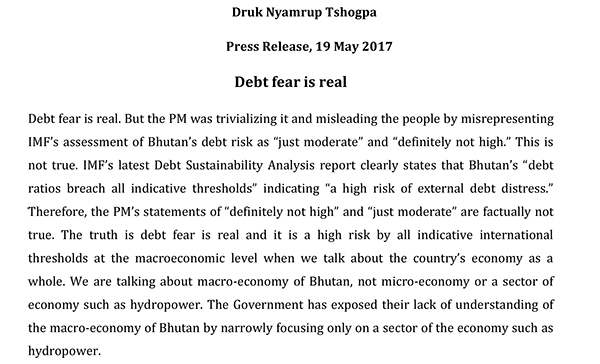
Druk Nyamrup Tshogpa (DNT) says Prime Minister Tshering Tobgay is misleading the people by misrepresenting the International Monetary Fund (IMF)’s assessment of Bhutan’s debt risk.
Talking to the media, last Friday, the Prime Minister said the country’s debt risk, as per the assessment, is just moderate and certainly not high.
In a news release, DNT shared with the media, the political party claims that the Prime Minister’s statement is not true.
The DNT justified IMF’s latest debt sustainability analysis report clearly mentions that Bhutan’s debt ratios breach all indicative thresholds, indicating a high risk of external debt distress.
According to the party, only as a mitigating factor of debt sustainability, the IMF took into consideration at the micro level such as a huge portion of the debt being hydropower debt and gave a conditional moderate risk for Bhutan, not “just moderate” as stated by the Government.
With figures from the IMF Database, the DNT says the debt to GDP ratio is increasing dangerously during the term of the present government.
The party went on to state that debt fear is real because as of now the national debt per capita is US $2,993 per citizen, which is almost 200,000 per Bhutanese.
Countering the allegations, Prime Minister Tshering Tobgay said the party has highlighted Bhutan’s debt to GDP ratio only up to 2017 from the assessment report.
In actual, the report forecasts the ratio up to 2022. Going by it, Bhutan’s debt to GDP ratio shows a decreasing trend.
The government also quoted the IMF report which states that India buys all surplus power that is not consumed domestically and the price is on a cost plus basis which includes a net return of 15 percent.
As a result, hydropower loans from India are more similar to foreign direct investment (FDI) rather than debt creating loans. Moreover in power-hungry India, there is little risk of insufficient demand for future hydropower supply.
This arrangement, according to the report, significantly reduced the risk of external debt distress.








